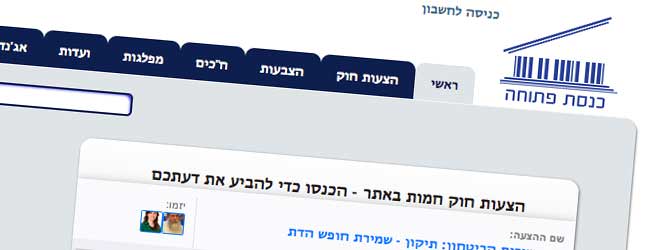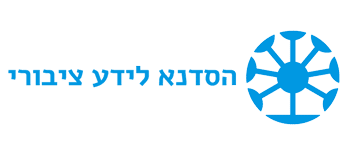
The “Open Knesset” project, developed by a community of volunteers, is the Workshop’s first. The project was born in 2009, even before the Workshop was formally established, from a realization that citizens have no way of knowing which elected politicians do their job faithfully and they have no practical ability to initiate action to influence the legislative process because there is no reliable information on Knesset activities available to them.
By making the information accessible and widening the public’s exposure to the Knesset and elected politicians, the objective of the Open Knesset project is to encourage the public to actively participate in political discourse.
The project is a website based on data that is mined from the Knesset website, re-processed and presented in convenient, user-friendly forms that support all internet browsers (as opposed to the Knesset site that only supports Internet Explorer). The accessible and reliable information can be crosscut in various ways to produce results to specific searches. The data on the website is collected and processed automatically by algorithms developed by the Workshop. Visitors to the site can improve and correct what they see and can also add an entirely new layer of commentary and discussion.
The Open Knesset website received media exposure, public recognition, and served as a foundation for critiques and public campaigns (see: Ynet article, TheMarker article, Israel Today article, Member of Knesset Dov Hanin mentions the project and recommends it during a meeting of the Internal Affairs Committee).
Hundreds of visitors enter the site each day to see what’s new, respond and debate. Among the users of the Open Knesset website one can find The Knesset Research and Information Center, Members of Knesset (MKs) and their assistants, lobbyists, journalists and media outlets, various NGOs, research institutions and, of course, many citizens who are interested in Knesset activities.
We are also working on further improving several aspects of the site:
-
Making it more inviting to the public by revamping the design and adding clear, plain language explanations to the Knesset information and processes.
-
Adding additional types of data that are currently not accessible to the public at all, such as votes of Knesset committee members and video documentation of committee deliberations.
-
Improving communication between the public and elected politicians by updating MKs on feedback and visitor recommendations relevant to the legislation bills they’ve proposed, as well as developing a public parliamentary question system through which citizens can address MKs collectively.
-
Enhancing performance to cope with the growing visitor rate.
To support the project, join Open Knesset’s Facebook page, the mailing list or make a donation.

